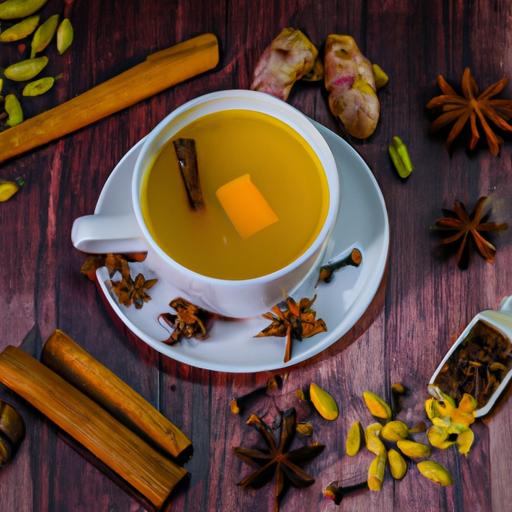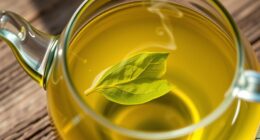Spice up your tea time with the perfect pairings! Get ready to tantalize your taste buds with the best spices to complement your turmeric tea. Take a sip and let the flavors dance on your palate, as I reveal the secrets to creating a truly sensational cup of tea.
Ginger, cinnamon, cardamom, black pepper, cloves, nutmeg, and star anise – these are the spices that will take your turmeric tea to the next level. Each spice brings its own unique aroma and taste, enhancing the already vibrant flavor of turmeric.
Why settle for a plain cup of tea when you can indulge in a symphony of flavors? The warm and zesty kick of ginger, the sweet and comforting notes of cinnamon, and the exotic essence of cardamom – these spices will elevate your tea-drinking experience to new heights.
But don’t just take my word for it. Discover the magic of these carefully chosen spices and elevate your tea time to a whole new level.
Get ready to spice up your life, one cup at a time!
Key Takeaways
- Ginger enhances the taste of turmeric tea and offers anti-inflammatory and digestive benefits.
- Cinnamon adds a warm aroma and helps regulate blood sugar levels while improving digestion.
- Cardamom complements the taste of turmeric tea and provides antioxidant properties, aiding in digestion.
- Star anise, with its licorice-like flavor, boosts the immune system and adds a delightful twist to turmeric tea, offering numerous health benefits.
Ginger
Ginger is an excellent choice to complement the flavors of turmeric tea. Not only does it enhance the taste, but it also brings numerous health benefits to the table. When combined with turmeric, ginger creates a powerful duo that packs a punch.
Ginger has long been recognized for its anti-inflammatory properties, making it a perfect addition to turmeric tea. Both spices contain compounds that can help reduce inflammation in the body, making them a dynamic duo for promoting overall health and well-being. Additionally, ginger has been known to aid digestion, relieve nausea, and boost the immune system.
Incorporating ginger into your turmeric tea recipe is a breeze. You can start by grating fresh ginger root and adding it to your tea as it brews. Alternatively, you can use ginger powder for a more convenient option. Simply sprinkle a teaspoon of ginger powder into your cup of turmeric tea, stir well, and enjoy the delightful flavors it brings.
Now, let’s move on to the next spice that pairs beautifully with turmeric tea – cinnamon.
Cinnamon
To enhance the flavor of your turmeric tea, you can add a sprinkle of cinnamon, which’ll give it a warm and comforting aroma that’ll make you feel like you’re sipping on a cozy cup of chai.
Cinnamon not only adds a delicious taste to your turmeric tea, but it also brings a range of health benefits. It’s known to have anti-inflammatory and antioxidant properties, which can help reduce inflammation in the body and protect against oxidative stress. Additionally, it may help regulate blood sugar levels and improve digestion.
There are creative ways to incorporate cinnamon into your turmeric tea recipes. You can simply sprinkle a pinch of cinnamon powder into your tea and stir it well. Alternatively, you can make a cinnamon-infused turmeric tea by simmering a cinnamon stick along with the turmeric and other spices. This’ll give your tea a richer and more intense cinnamon flavor.
As we move on to the next spice, cardamom, you’ll discover how it complements the taste of turmeric tea with its unique and aromatic flavor.
Cardamom
When you add a pinch of cardamom to your turmeric tea, it adds a delightful burst of aromatic flavor that will transport you to a cozy café in the heart of a bustling spice market. Cardamom, with its unique taste and aroma, is the perfect spice to complement the earthy notes of turmeric. But it doesn’t just enhance the flavor; it also brings a host of health benefits.
Cardamom is known for its antioxidant properties, which can help protect your body against cellular damage and reduce inflammation. It has also been used in traditional medicine to aid digestion and soothe gastrointestinal issues. Additionally, cardamom has antimicrobial properties that may help fight off infections.
If you’re looking to explore the versatility of cardamom beyond turmeric tea, there are plenty of recipes that showcase its unique flavor. From sweet treats like cardamom-infused cookies and cakes to savory dishes like curries and pilafs, cardamom adds a touch of exoticism to any culinary creation.
Next, let’s dive into the benefits of pairing turmeric tea with black pepper, another spice that packs a flavorful punch.
Black pepper
Black pepper, with its fiery kick and distinct flavor, can take your turmeric tea to new heights of taste sensation. Not only does it add a bold and spicy element to your tea, but black pepper also offers numerous health benefits. This humble spice is rich in antioxidants, which can help protect your body against harmful free radicals. Additionally, black pepper has been shown to aid in digestion by stimulating the secretion of enzymes in the pancreas and intestines.
When it comes to incorporating black pepper in turmeric tea, a little goes a long way. Start by adding a pinch of freshly ground black pepper to your tea, and adjust according to your taste preference. The combination of turmeric and black pepper is particularly potent, as black pepper enhances the absorption of curcumin, the active compound in turmeric.
The benefits of black pepper in turmeric tea are not limited to taste and digestion. Studies have suggested that the combination of black pepper and turmeric may have anti-inflammatory properties and could potentially help reduce inflammation in the body. This powerful duo may also support a healthy immune system and promote overall well-being.
Now, let’s move on to the next spice that pairs well with turmeric tea – cloves.
Cloves
Cloves, with their warm and aromatic flavor, add a delightful twist to your turmeric tea, elevating its taste experience. Not only do they enhance the flavor profile, but cloves also come with a plethora of health benefits.
These small, brown, flower buds are packed with antioxidants, which help combat inflammation and oxidative stress in the body. They are also known for their antibacterial properties, aiding in fighting off infections and boosting the immune system.
When it comes to using cloves in cooking, there are various ways to incorporate them into your dishes. You can add whole cloves to your turmeric tea while brewing it, allowing the flavors to infuse together. Alternatively, you can grind cloves into a fine powder and mix it with turmeric and other spices to create a homemade spice blend for your tea. Additionally, cloves can be used in baking, adding a warm and aromatic touch to cakes, cookies, and pies.
Now, let’s move on to the next spice to pair with turmeric tea, nutmeg.
Nutmeg
Nutmeg, known for its warm and aromatic flavor, has been used for centuries in traditional medicine to aid digestion and promote relaxation, with studies showing that it may have potential anti-anxiety effects.
When it comes to enhancing the flavor of nutmeg in turmeric tea, there are several spices that complement its unique taste.
-
Cinnamon: Adding a dash of cinnamon to your turmeric tea can enhance the warm and comforting notes of nutmeg, creating a delightful flavor combination.
-
Cardamom: The citrusy and herbal undertones of cardamom pair exceptionally well with nutmeg, adding a refreshing twist to your turmeric tea.
-
Ginger: Known for its spicy and zesty flavor, ginger can bring a subtle kick to your nutmeg-infused turmeric tea, creating a harmonious blend of tastes.
-
Black pepper: Adding a pinch of black pepper can amplify the earthy and slightly sweet flavors of nutmeg, providing a well-rounded taste to your turmeric tea.
In addition to enhancing the flavor, adding nutmeg to turmeric tea can offer a range of health benefits. Nutmeg is rich in antioxidants and may help reduce inflammation in the body. It’s also believed to aid digestion and relieve stomach discomfort. Incorporating nutmeg into your turmeric tea can be a delicious way to enjoy its potential health benefits.
Transitioning to the next section, let’s explore the unique qualities of star anise and how it can complement the flavors of turmeric tea.
Star anise
Star anise, with its distinctive licorice-like flavor, adds a unique and aromatic twist to your cup of golden goodness. This spice not only enhances the taste of turmeric tea but also brings along a plethora of health benefits. Star anise is known for its strong antibacterial and antifungal properties, making it a great addition to your daily routine.
The flavor profile of star anise is complex and intense, with hints of sweetness, warmth, and a subtle bitterness. It pairs beautifully with the earthy and slightly bitter taste of turmeric, creating a perfectly balanced cup of tea.
To give you a better idea of the flavor profile and health benefits of star anise, here is a table that breaks it down:
| Flavor Profile | Health Benefits |
|---|---|
| Licorice-like | Antibacterial properties |
| Sweet | Antifungal properties |
| Warm | Aids digestion |
| Subtle bitterness | Boosts immune system |
| Intense | Relieves respiratory issues |
Including star anise in your turmeric tea not only adds a delightful twist but also provides numerous health benefits. So, why not give this flavorful spice a try and elevate your cup of golden goodness to new heights?
Frequently Asked Questions
How does ginger enhance the flavor of turmeric tea?
Ginger adds a delightful twist to turmeric tea, enhancing its flavor with a subtle and invigorating kick. It complements turmeric tea perfectly, but if you’re looking for alternatives, you can try other spices like cinnamon or cardamom. Experiment with different turmeric tea recipes to find your favorite blend!
Are there any health benefits associated with adding cinnamon to turmeric tea?
Adding cinnamon to turmeric tea may potentially improve digestion due to its natural anti-inflammatory properties. It can also enhance the flavor and aroma of the tea, making it a delicious and healthy beverage choice.
Can cardamom be used in turmeric tea for its medicinal properties?
Yes, cardamom can be used in turmeric tea for its medicinal properties. Turmeric tea with cardamom benefits include its anti-inflammatory and digestive properties, as well as its ability to support heart health and improve digestion.
What role does black pepper play in enhancing the bioavailability of turmeric in tea?
Black pepper is key to unlocking turmeric’s potential. It enhances turmeric’s absorption, increasing its bioavailability. Other spices like ginger and cinnamon also amplify turmeric’s benefits, creating a powerful and flavorful blend in turmeric tea.
Are there any specific precautions to take when using cloves, nutmeg, or star anise in turmeric tea?
When using cloves, nutmeg, or star anise in turmeric tea, it is important to be aware of potential side effects. These spices should be used in moderation and according to recommended dosage to avoid any adverse reactions.
Conclusion
In conclusion, the best spices to pair with turmeric tea are ginger, cinnamon, cardamom, black pepper, cloves, nutmeg, and star anise. These spices not only enhance the flavor of the tea but also provide numerous health benefits.
For example, ginger is known for its soothing properties and can relieve digestive issues. Similarly, black pepper can increase the bioavailability of turmeric, allowing the body to absorb its beneficial compounds more effectively.
Just like a symphony, where each instrument adds depth and richness to the music, these spices harmonize with turmeric tea to create a delightful and nourishing beverage.
So, next time you brew a cup of turmeric tea, remember to add a pinch of these spices and savor the flavorful symphony of health.










